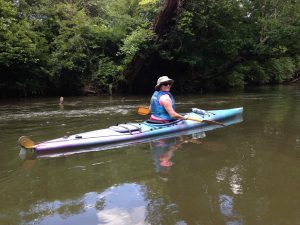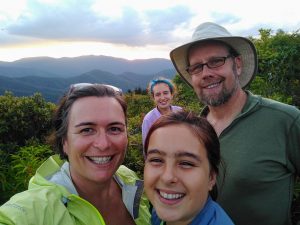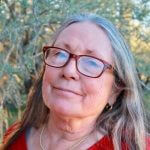Diana Toledo
Originally from Gijón, Asturias (Spain), Diana Toledo (she/her) now lives and works in Asheville, North Carolina, on Anigiduwagi, more commonly known as the Cherokee, lands.
Diana joined River Network in 2006. As Senior Director of River Programs, Diana is responsible for developing resources, delivering training and technical assistance and facilitating peer-to-peer learning in the areas of Resilient Cities and Communities and Strong Organizations and Leaders. Diana earned her Bachelor of Science degree in Microbiology and Environmental Studies from Indiana University – Bloomington and a Master of Science degree in Water Resources Management from the Nelson Institute for Environmental Studies at the University of Wisconsin – Madison. Previously, Diana helped build a strong, statewide network of watershed organizations while at the River Alliance of Wisconsin and advanced Great Lakes policy and funding initiatives while at the Wisconsin Coastal Management Program.

Afternoon paddle on the French Broad River.
Outside of work, Diana volunteers her time with organizations whose missions align with her passions – environmental conservation and ensuring children and families have equitable access to education and economic stability. She also keeps busy running a hectic household that includes her partner, two teenagers, a dog, five chickens, three bee hives and a very weedy garden.
What called you to work in water?
I grew up on the Asturian coast of northern Spain, a mountainous region that is intrinsically tied to water through its food, culture, and the traditional trades of shipbuilding and commercial fishing. Clean, plentiful water – I simply took it for granted as a source of food, a childhood playground, a part of my identity.
Fast forward a decade… I spent two years living in Monción, a small city in the Dominican Republic, while a large-scale hydropower dam was being built that would eventually flood 13 small, rural communities where I worked as a Peace Corps volunteer supporting public school teachers. I watched friends and colleagues in those communities struggle to be heard – demanding fair compensation for their lands and assistance to relocate their families elsewhere.
Those two singular experiences have inspired my work on water. I am motivated to do all I can to strengthen communities’ efforts to have a seat at the table when decisions are being made that impact their communities’ water resources and quality of life.
If you didn’t work in water or conservation, what would you be doing?
At its core, “water work” is water justice work. How can we develop more democratic policies and more sustainable water management practices, so that we have more equitable access to clean, healthy and affordable water? It’s that element of justice that motivates me. And so, I’d likely be working for justice in a different setting where unjust outcomes are unfortunately the norm; increasing educational access, reforming the criminal justice system and ensuring reproductive rights are three that rank very highly for me.
How do you recharge outside of work?

A family camping/blueberry picking outing in the Blue Ridge Mountains.
I head outside. To garden, to explore the beautiful mountains around my home in Asheville, NC, or to remove weeds and invasives as we work to restore an 80-acre homestead where my partner’s family first settled 4-5 generations ago. And I spend all the time I can with my teenagers, while they are still nearby and still willing!







